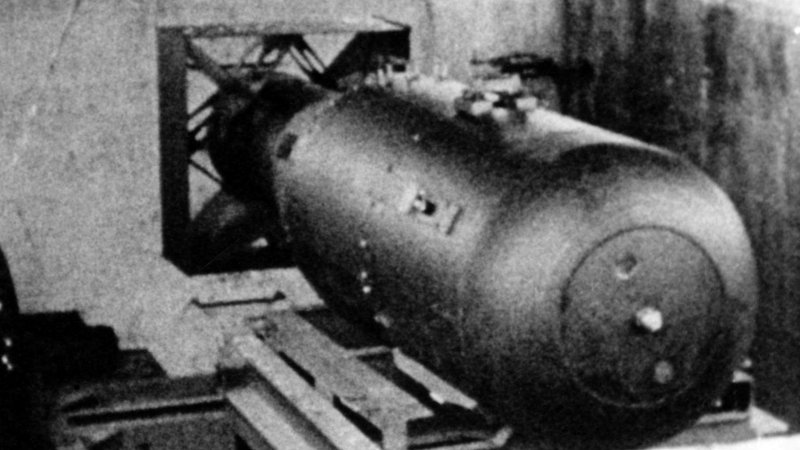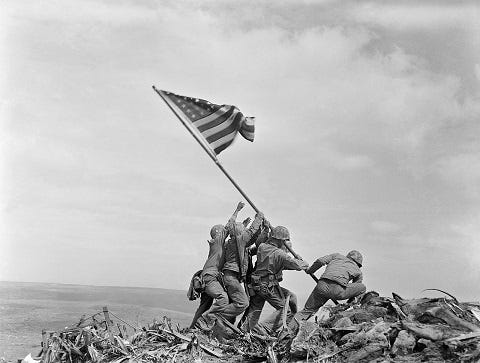
Today (Sunday) marks the 78th anniversary of the Enola Gay, piloted by Colonel Paul Tibbets, dropped the atomic bomb that destroyed Hiroshima. Three days later, we dropped the second atomic bomb on Nagasaki. The Japanese warlords still voted 3-3 on surrendering. Intervention by the emperor ended the war and the Japanese told the allies it planned to surrender, which it did on September 2.
With the new movie Oppenheimer’s debut last month and the end of the teaching of American history in a positive light, lefties have resurrected the argument against using the A-bomb to end World War II.
The Atlantic published the first and perhaps only rebuttal you need to read to this daft argument in December 1946. Written by Karl T. Compton, an atomic physicist and president of MIT, one of the many people involved in the development of these two bombs, the article addressed the argument against the bombings.
Compton wrote, “About a week after V-J Day I was one of a small group of scientists and engineers interrogating an intelligent, well-informed Japanese Army officer in Yokohama. We asked him what, in his opinion, would have been the next major move if the war had continued. He replied: ‘You would probably have tried to invade our homeland with a landing operation on Kyushu about November 1. I think the attack would have been made on such and such beaches.’
“‘Could you have repelled this landing?’ we asked, and he answered: ‘It would have been a very desperate fight, but I do not think we could have stopped you.’
“‘What would have happened then?’ we asked.
“He replied: ‘We would have kept on fighting until all Japanese were killed, but we would not have been defeated,’ by which he meant that they would not have been disgraced by surrender.
“It is easy now, after the event, to look back and say that Japan was already a beaten nation, and to ask what therefore was the justification for the use of the atomic bomb to kill so many thousands of helpless Japanese in this inhuman way; furthermore, should we not better have kept it to ourselves as a secret weapon for future use, if necessary? This argument has been advanced often, but it seems to me utterly fallacious.”
The Japanese would rather die than surrender. They proved this in battle after battle.
The Battle of Iwo Jima began on February 19, 1945. Four days later, six Marines from E Company, 2nd Battalion, 28th Marines raised the flag at Mount Suribachi. The Japanese kept fighting for another month. 18,375 of the 21,060 Japanese soldiers in the battle died — most of them fighting long after those Marine raised our flag. Only three of those Marines left Iwo Jima alive.
Leona Woods, the only woman physicist in the Manhattan Project, was quite proud of her work alongside Enrico Fermi. She hid her first pregnancy in order to keep working. The baby showed no ill-effect, by the way.
Woods was no token and no diversity hire. She said, “My job was to use the expertise I already had to build boron trifluoride counters for detection of the neutron flux in the chain-reacting pile yet to be built. But Fermi gave me also the job of taking notes on his lectures to the crew who would build the chain-reacting pile under the west stands.”
The stands refer to the Amos Alonzo Stagg Field that stood empty at the University of Chicago after it dropped football.
For her, the bomb was personal.
She said, “I certainly do recall how I felt when the atomic bombs were used. My brother-in-law was captain of the first minesweeper scheduled into Sasebo Harbor. My brother was a Marine, with a flame thrower, on Okinawa. I’m sure these people would not have lasted in an invasion. It was pretty clear the war would continue, with half a million of our fighting men dead not to say how many Japanese.
“You know and I know that General (Curtis) LeMay firebombed Tokyo and nobody even mentions the slaughter that happened then. They think Nagasaki and Hiroshima were something compared to the firebombing.
“THEY’RE WRONG! I have no regrets. I think we did right, and we couldn’t have done it differently. Yeah, I know it has been suggested the second bomb, Nagasaki, was not necessary. The guys who cry on shoulders. When you are in a war, to the death, I don’t think you stand around and ask, ‘Is it right?’”
Pearl Harbor removed that question. The Japanese sneak attack was unprovoked. While it is fashionable among some conservatives these days to say FDR baited Japan, the fact is Japan had no reason to attack. FDR imposed sanctions for very good reasons. History calls one of those reasons the Rape of Nanking.
Australia’s Pacific War site reported, “The Japanese were infuriated by the strength of Chinese resistance, and when China's Nationalist capital Nanking fell in December 1937, Japanese troops immediately slaughtered thousands of Chinese soldiers who had surrendered to them. The Japanese then rounded up about twenty thousand young Chinese men and transported them in trucks outside the city walls where they were killed in a massive slaughter. Japanese troops were then encouraged by their officers to loot Nanking, and slaughter and rape the Chinese population of the city.
“For six weeks, life for the Chinese in Nanking became a nightmare. Bands of drunken Japanese soldiers roamed the city, murdering, raping, looting, and burning at whim. Chinese civilians who were stopped on the street, and found to possess nothing of value, were immediately killed. At least twenty thousand Chinese women were raped in Nanking during the first four weeks of the Japanese occupation, and many were mutilated and killed when the Japanese troops were finished with them.
“The Japanese troops were encouraged by their officers to invent ever more horrible ways to slaughter the Chinese population of the city. When the bodies of murdered Chinese choked the streets and the gutters ran red with their blood, the Japanese were forced to refine their methods of slaughter in the interest of preventing the spread of disease. Batches of Chinese civilians were rounded up and herded into slaughter pits. Here the grinning Japanese soldiers would either bury them alive, hack them to death with their swords, use them for bayonet practice, or pour petrol on the victims and burn them alive. The bodies of thousands of victims of the slaughter were dumped into the Yangtze River until the river was red with their blood. After looting Nanking of anything of value, the Japanese started fires that gutted one third of the city.”
This was not disinformation or propaganda. Nor was Japan using 200,000 captured women as prostitutes for their soldiers.
After Pearl Harbor, the Japanese turned to committing atrocities against American troops. There was the Bataan Death March — a totally unnecessary 100-mile march that resulted the death of half the American POWs. The follow up was the Sandakan Death March.
Bombing Japan into surrender was the only option. Harry S. Truman considered the bombing to be his biggest achievement as president and rightly so. He had survived as a field artillery officer that meatgrinder we now call World War I.
Truman wrote a letter to Compton in response to that Atlantic article.
The president said, “Your statement in the Atlantic Monthly is a fair analysis of the situation except that the final decision had to be made by the President, and was made after a complete survey of the whole situation had been made. The conclusions reached were substantially those set out in your article.
“The Japanese were given fair warning, and were offered the terms which they finally accepted, well in advance of the dropping of the bomb. I imagine the bomb caused them to accept the terms.”
The only reason we did not drop three bombs is that we did not have a third one.
We do now.
To the rest of the world, I say don’t want none, don’t start none.
Don Surber is a retired newspaperman who lives in Poca, West Virginia, with his wife of 40 years, Lou Ann. They have three adult children.While serving in the US Army, Surber worked on the Fort Stewart Patriot and the Stars and Stripes
